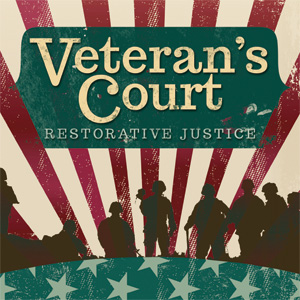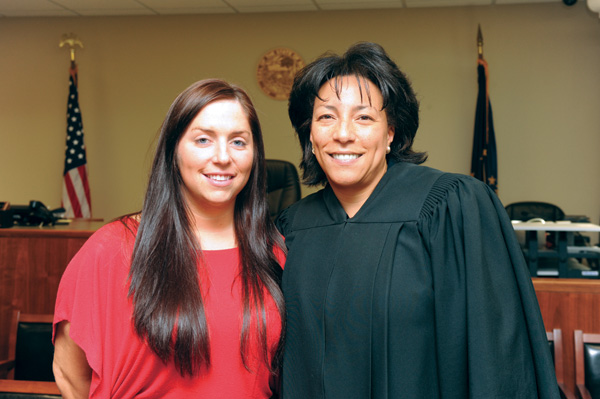 The first defendant called on the Initial Hearing docket is a 25-year old, well-mannered and well-groomed, male who stands at attention, but his eye contact is distant and blank. He is charged with Possession of a Controlled Substance, a Class D Felony. Service members who run afoul of the law in returning to civilian life are appearing before Indiana’s courts at a greater frequency due to the Iraq and Afghanistan wars.
The first defendant called on the Initial Hearing docket is a 25-year old, well-mannered and well-groomed, male who stands at attention, but his eye contact is distant and blank. He is charged with Possession of a Controlled Substance, a Class D Felony. Service members who run afoul of the law in returning to civilian life are appearing before Indiana’s courts at a greater frequency due to the Iraq and Afghanistan wars.
There are 1.7 million veterans of Iraq and Afghanistan, according to the group Iraq and Afghanistan Veterans of America. Seventy percent of Indiana’s military come from the reserve component of the armed forces. These citizen patriots are everyday Hoosiers who put their lives on hold to defend, aid and protect their communities. Many have served multiple deployments. They are called away from their jobs and families for approximately 400 days, with the first 90 days for training, the next 270 days in imminent danger, then 40 days to transition back home. During these deployments, a veteran will see a lot of things, and even do some things, that eventually take a toll. The veteran may not be able to “shake it” on his own. Returning service members can have serious emotional problems that lead to criminal behavior. Veterans Court is specifically designed to work with these veterans.
Veterans Court is an interventionist approach that addresses the cause leading to criminal behavior and supports the guarantee of restorative justice founded in the Indiana Constitution. The goal of Veterans Court is to rehabilitate instead of incarcerate. Veterans struggling with post traumatic stress, brain trauma, anxiety, depression, chemical dependency, unemployment, and homelessness are being asked to do more than get treatment. There is a complete case plan, including tools for rehabilitation and readjustment. If a veteran is homeless, then he is going to get off the streets. If a veteran is unemployed, then she will get into a jobs program.
Early identification and prompt placement of veterans in the program is an important key component to success. The county sheriff can provide assistance with tracking veterans at the point of first entry into the criminal justice system through the county jail. This is a collaborative effort, and the Department of Veterans Affairs (VA) is a key partner that performs assessments and evaluations, provides evidence-based treatment options for military service-related illness, and reaches out to incarcerated veterans to connect them to services upon release from jail. The services of the VA are not funded by local taxpayers, and local treatment services stay open and available to individuals who have not served in the armed forces.

The structure and eligibility for Veterans Court is governed by IC 33-23-16 and the Problem Solving Court Rules. All problem-solving courts, including Veterans Courts, are certified by the Indiana Judicial Center. As you plan to start a Veterans Court, you will be required to establish policies and procedures that govern all of the operations of the court. The Indiana Judicial Center will monitor the legal compliance of these policies and procedures and periodically review the operations of certified problem solving courts.
Male or female service members over age 18 who are typically charged with low-level, non-violent crimes carrying a relatively short period of incarceration are eligible. A Veterans Court program can be organized to serve the judicial administrative district where it is located or to accept supervision of cases originating outside of the county. Those interested in a Veterans Court program should contact the Indiana Judicial Center for information about requirements for certification or guidelines regarding transfer of supervision to Veterans Court.
The veteran remains in the community while undergoing treatment and is subject to frequent monitoring for compliance with his case treatment plan, orders of the court, and abstinence from alcohol and drugs. The judge regularly checks on the veteran’s progress taking on a supportive and empathetic style rather than that of an arbiter. A team including the prosecutor, defense counsel, the VA, community treatment providers, and military support personnel offers a coordinated response to a veteran’s compliance. Effectiveness is measured by evaluating performance and achievement of program goals. If the veteran fails to meet the requirements of the program, such as failing drug screenings or disobeying court orders, the court will impose sanctions which may include community service, fines, reports, or short jail stays.
The camaraderie among veterans is a unique and powerful connection. So, veteran mentors are a valuable asset to the program. The role of a veteran mentor says, “We’re here for you, no matter what.” Peer support of veterans in the program lets each of them know that someone understands, has their back, and is living proof that everything is going to be okay.
Hoosiers not only benefit from Veterans Courts by less crime in the community and reduced recidivism, but also by saving costs of incarceration. Military service members have done more than their fair share for the rest of us. Veterans Court honors their past service and re-awakens in them the sense of pride, duty and courage they will need to conquer the challenges facing them that brought them to the court. They are armed with the tools they need to manage their own care and, once again, to be productive assets to their communities.